Lord Dattatreya’s Gurus
LORD DATTATREYA
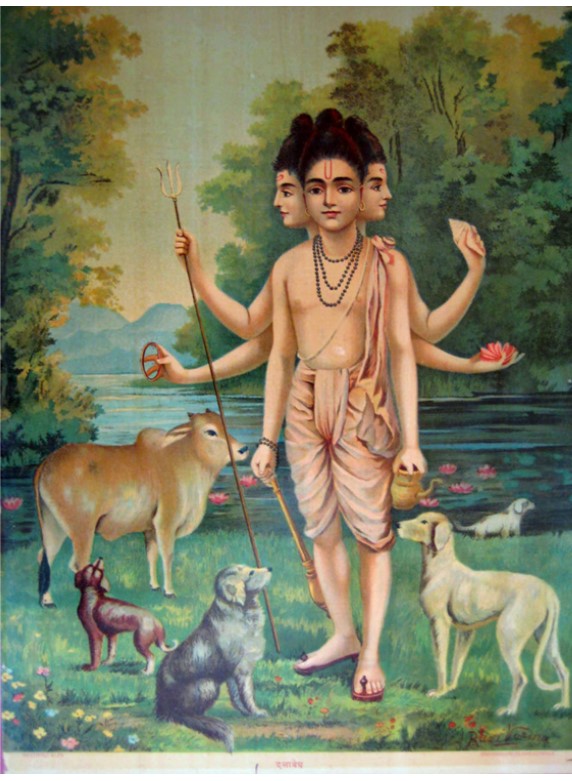
Lord Dattatreya completely immersed himself into universal consciousness by keenly observing nature and his environment. He had twenty-four Gurus, from aspects of nature. Over time many great beings were identified as incarnations of the Lord Dattatreya.
Lord Dattatreya’s First Guru, The Earth (Prithvi) (Along with Mountain & Trees)
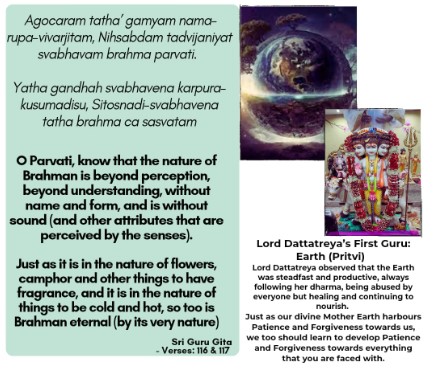
The Earth, as a guru, teaches patience and forgiveness through its ability to endure countless beings and phenomena without discrimination. It supports all forms of life, providing sustenance without expectation of reward. This steadfastness and acceptance embody the qualities of tolerance and forgiveness. The Earth remains steady and unchanging despite the various disturbances upon it, symbolizing the virtue of maintaining inner calm and unwavering support for others, even in challenging situations.
Lord Dattatreya’s Second Guru, Water (Jal)
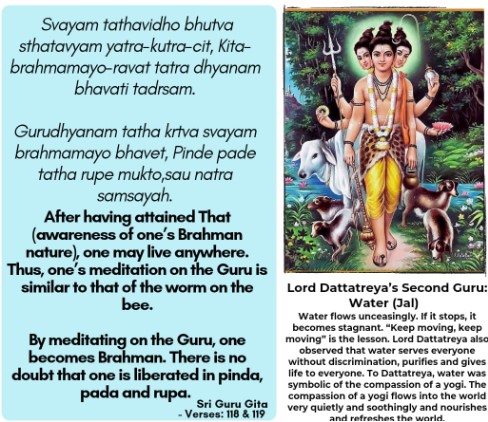
Water, or Apas, embodies adaptability and flexibility. Its ability to conform to the shape of any container and flow around obstacles illustrates the importance of being adaptable in life. Water’s fluid nature teaches us to adjust to circumstances and challenges with grace, without rigidly clinging to one way of being. It symbolizes the virtue of resilience and the power of embracing change with an open heart.
Lord Dattatreya’s third Guru, Fire (Agni)

Fire, or Agni, represents transformation and purification. Through its inherent ability to change the form of matter and cleanse impurities, Fire teaches us the value of change and inner transformation. Just as Fire purifies and renews, it encourages us to embrace the process of personal growth and transformation, shedding old habits and beliefs to become more refined and enlightened beings.
Lord Dattatreya’s fourth Guru, Air (Vaayu)
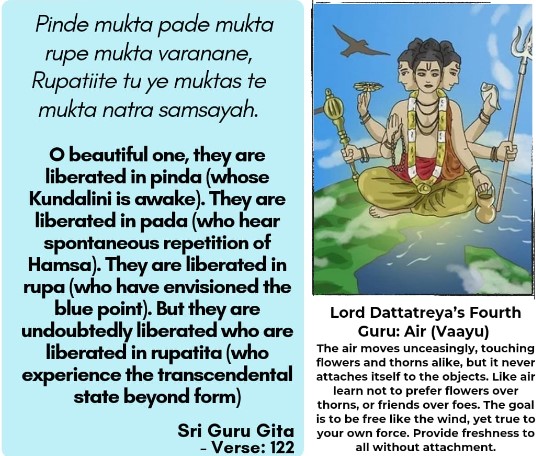
The Air, or Vayu, signifies the principle of detachment and freedom. As it flows effortlessly and without bounds, Air illustrates the ability to move beyond physical and emotional constraints. It reminds us of the importance of maintaining a sense of freedom from material possessions and worldly desires. By embracing the Air’s boundless nature, we learn to rise above attachments and cultivate a sense of liberation and peace in our lives.
Lord Dattatreya’s Fifth Guru, The Sky (Aakash)
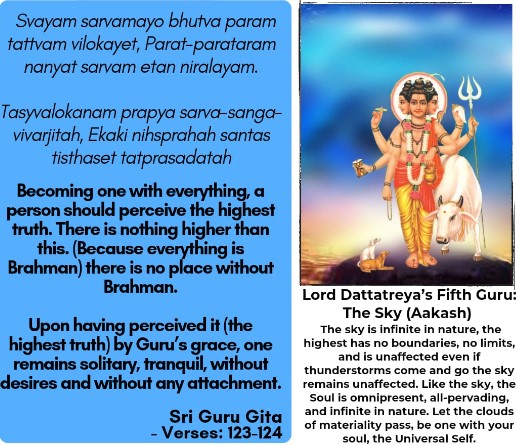
The Sky, or Akasha, represents boundlessness and expansiveness. It encompasses everything beneath it and extends infinitely, symbolizing the limitless nature of consciousness and the expansive potential of the human spirit. The Sky’s vastness reminds us of the importance of thinking beyond limitations and embracing a sense of infinite possibilities in our journey of self-realization and spiritual growth.
Lord Dattatreya’s Sixth Guru, The Moon (Chandarmaa)
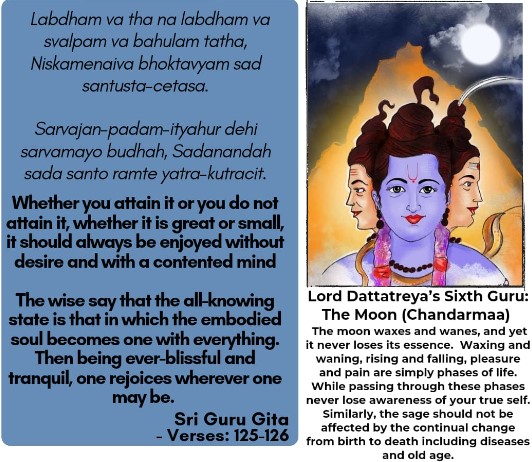
The Moon, or Chandra, symbolizes reflectiveness and calmness. Unlike the Sun, the Moon reflects the light of the Sun, representing the quality of introspection and the importance of reflecting on our thoughts and actions. The Moon’s gentle light reminds us to look within ourselves for guidance and understanding, and to approach life with a sense of tranquility and contemplation.
Lord Dattatreya’s Seventh Guru, The Sun (Surya)
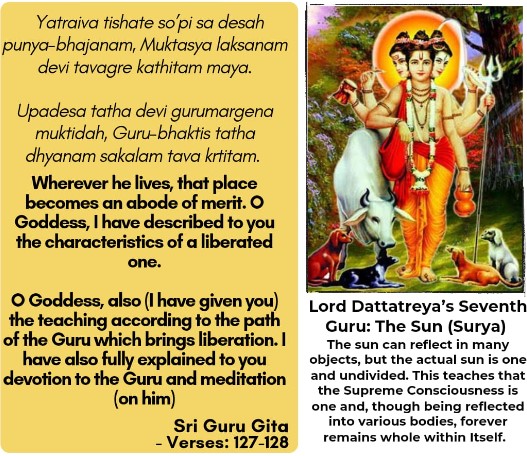
The Sun, or Surya, signifies self-effulgence and inner light. It shines with its own inherent brilliance, providing light and warmth to all without relying on external sources. The Sun teaches us the importance of self-reliance and inner illumination, encouraging us to cultivate our own inner light and strength. It reminds us that true wisdom and power come from within, and we should strive to develop our own potential.
Lord Dattatreya’s Eight Guru, The Pigeon (A Bird)
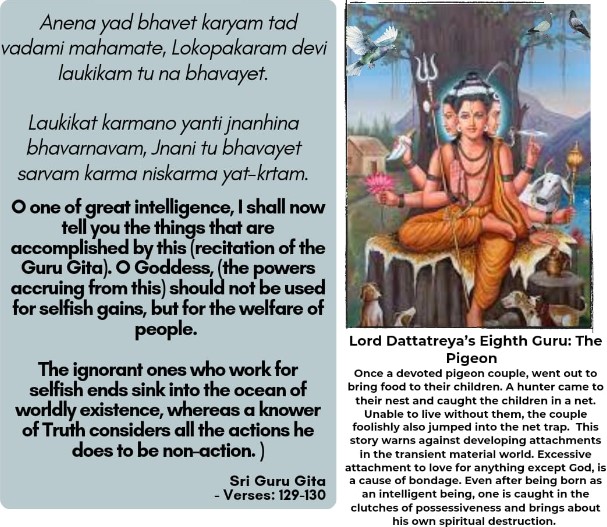
The Pigeon, or Kapota, illustrates the pitfalls of attachment and desire. Pigeons are known for their strong attachment to their mates and nests, which can lead to difficulties when their attachments are threatened. This teaches us the drawbacks of excessive attachment and how it can lead to suffering. By observing the pigeon, we learn the importance of cultivating detachment and understanding that attachment to people or things can hinder our spiritual progress.
Lord Dattatreya’s Ninth Guru, The Python (Ajgar)
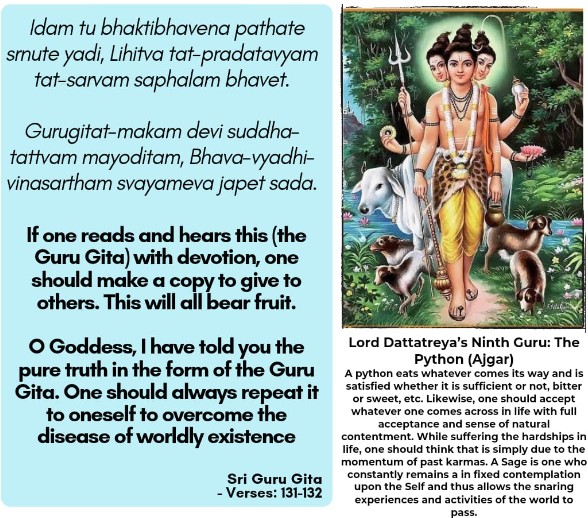
The Python, or Aja, represents contentment and non-attachment. Unlike other animals that actively seek out food, the python waits patiently for its prey, illustrating the virtue of being content with whatever comes our way. This teaches us the value of contentment and the importance of accepting life as it is, without excessive craving or desire. The python’s ease in accepting whatever comes its way reminds us to find satisfaction in simplicity.
Lord Dattatreya’s Tenth Guru, The Ocean (Sea, Samudra)

The ocean, which holds all the waters, receives and absorbs water from every river in the world but never exceeds its boundaries. This taught me that regardless of the experiences I face or the challenges I encounter, I must always maintain my discipline. Lord Dattatreya noted that the ocean remains constant, neither rising with the influx of rivers nor falling when the flow stops. It stays calm and within its limits, except during natural disasters.
Lord Dattatreya’s Eleventh Guru, The Moth (Grasshopper, Patanga)
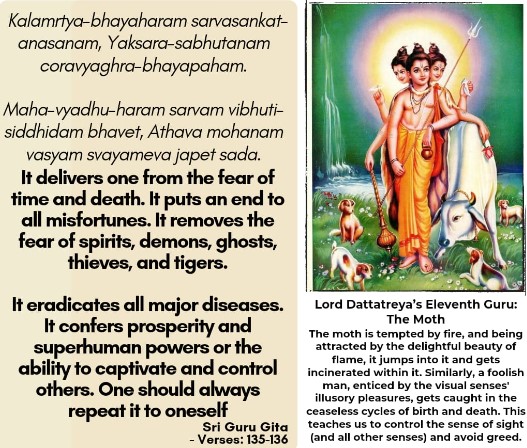
The moth is my eleventh guru. Attracted to light, it leaves its home to sacrifice itself in the flame. This taught me that upon seeing the light of knowledge, I must overcome my fear, rush forward, and immerse myself in it to be transformed. The lesson here is to strive to control all senses and focus the mind on the Self, avoiding greed. Like the moth, a foolish person is lured by the illusory pleasures of the senses and becomes trapped in the endless cycles of birth and death. Always question your senses, what others tell you, and what you see, knowing that senses can deceive, and seek reason.
Lord Dattatreya’s Twelfth Guru, The Bumblebee
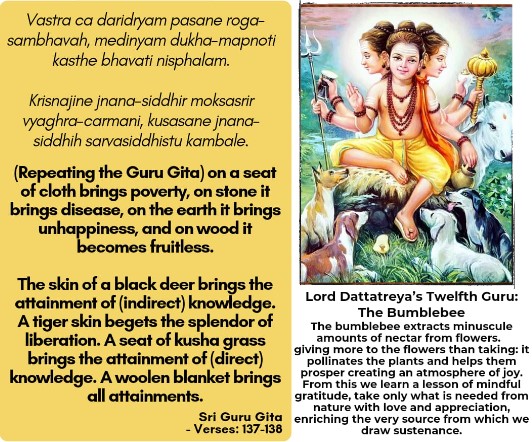
My twelfth guru is the bumblebee, which extracts only small drops of nectar from flowers. Before doing so, it hums, hovers, and dances, spreading joy around the blossom. The bumblebee not only sings a cheerful tune but also gives back more than it takes by pollinating plants and helping them thrive as it moves from flower to flower. From the bumblebee, I learned to take only a little from nature and to do so joyfully, enriching the source from which I derive sustenance.
Lord Dattatreya’s Thirteenth Guru, The HoneyBee (Madhu Makhi)

My thirteenth guru is the honeybee, which collects more nectar than it needs. It gathers nectar from various sources, transforms it into honey, and brings it back to the hive, consuming only a small portion and sharing the rest. From this, I learned to seek wisdom from many teachers, process what I learn, and apply the knowledge beneficial to my growth. Additionally, I should be willing to share my knowledge with others. The lesson here is to actively seek knowledge, gather wisdom from diverse sources, choose the best parts, live harmoniously, and respect other ideologies.
Lord Dattatreya’s Fourteenth Guru, The Elephant (Haathi)
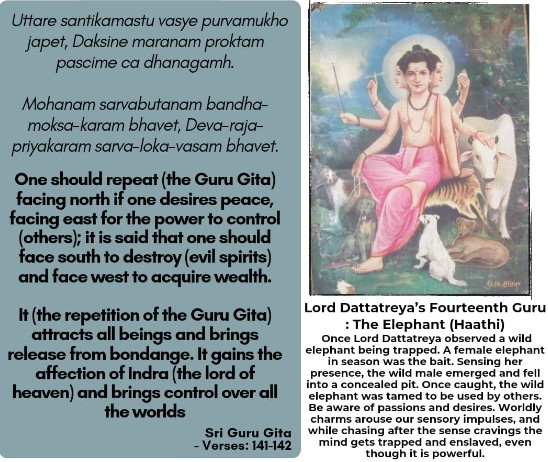
Once, I witnessed a wild elephant being trapped using a tame female elephant in season as bait. Drawn by her presence, the wild male left its domain and fell into a cleverly concealed pit. Once caught, it was tamed for use by others. This wild elephant is my fourteenth guru because it taught me to be cautious with my passions and desires. Worldly attractions stir our sensory impulses, and in pursuing these cravings, the mind can become trapped and enslaved despite its strength. The lesson here is for spiritual seekers to free themselves from the grip of lust, avoid falling into traps set by others or sensory gratification, and heed the elephant's warning about the overwhelming distractions caused by uncontrolled desires.
Lord Dattatreya’s Fifteenth Guru, The Deer (Hiran)
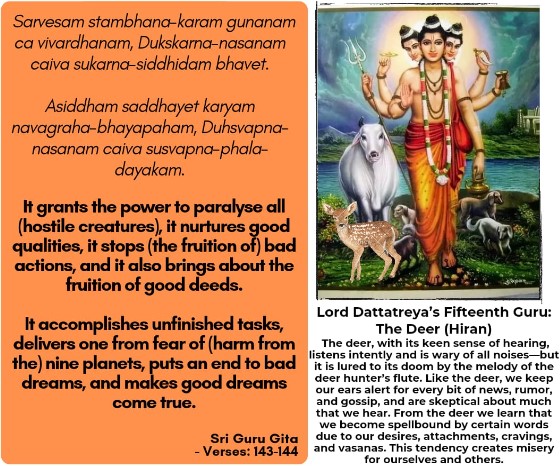
The Deer, or Mriga, embodies alertness and mindfulness. The deer’s constant vigilance and awareness of its surroundings highlight the importance of being mindful and attentive in all aspects of life. Its swift reactions to potential threats teach us the need to stay alert and present, cultivating a heightened sense of awareness that allows us to navigate challenges effectively and make wise decisions.
Lord Dattatreya’s Sixteenth Guru, The Fish (Machali)

The Fish, or Matsya, represents discrimination and discernment. Fish are often cautious and selective about their environment, teaching us the importance of careful judgment and discernment in our lives. This lesson emphasizes the value of being perceptive and making thoughtful decisions, discerning between what is beneficial and what is harmful, and navigating life with a clear sense of direction and purpose.
Lord Dattatreya’s Seventeenth Guru, Pingala (A Dancing Girl)
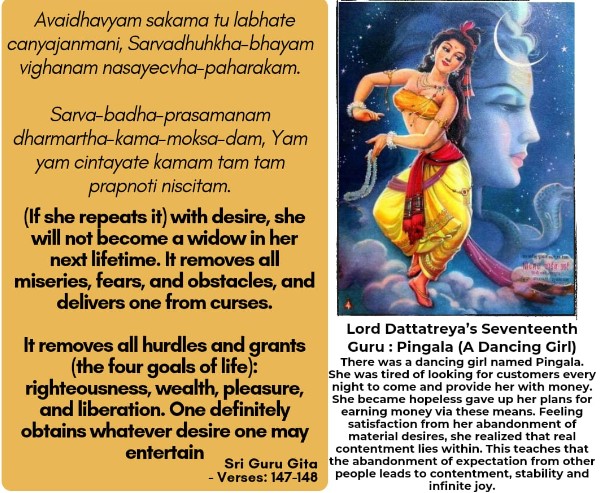
A prostitute knows she doesn’t love her customers, and they don’t love her. She waits for them and acts out a performance of love when they come, but she isn’t satisfied with the artificial love or the payment she receives. This realization made me see that all humans are like prostitutes, with the world as the customers exploiting us. The payment is always inadequate, leaving us dissatisfied. Therefore, I decided not to live like a prostitute. Instead, I will live with dignity and self-respect, not expecting the world to provide material or internal satisfaction. I will find satisfaction within myself. The lesson here is to abandon expectations from people, leading to contentment and infinite joy. Pingala warns us against worldly attachments.
Lord Dattatreya’s Eighteenth Guru, The Bird of Prey (Kurari Bird, Hawk)
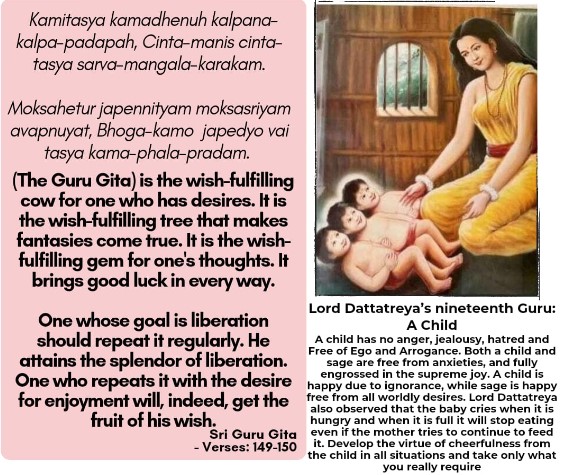
My eighteenth guru is the little bird carrying a worm in its beak. Larger birds chased and pecked at him until he dropped the worm. From this, I learned that the key to survival is renunciation, not possession. Lord Dattatreya noted that a Kurari bird once picked up some food, attracting the attention of stronger, hungry birds who attacked to steal it. To find peace and escape the attack, the bird had to drop the food. Once it did, the other birds left it alone and went for the food instead.
Lord Dattatreya’s nineteenth Guru, A Child
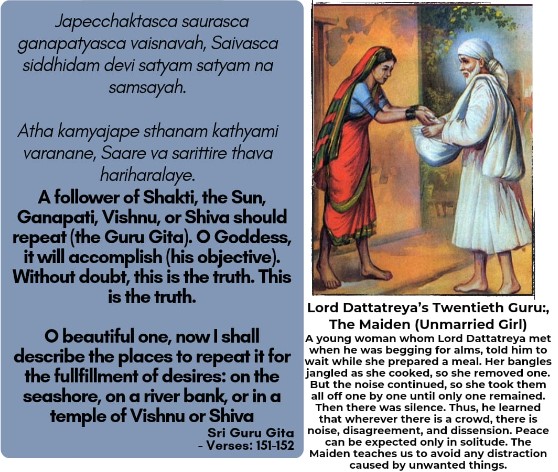
My nineteenth guru is the baby who cries when hungry and stops once it starts suckling at its mother’s breast. When the baby is full, it stops feeding, and no matter what the mother does, she can't make it take more milk. From this baby, I learned to ask only for what I truly need, to take only what is required, and then turn away. A child has no grievances, anger, jealousy, hatred, and is free of ego and arrogance. Both a child and a sage are free from anxieties and fully immersed in supreme joy. A child is happy and content due to ignorance, while a sage is happy from being free of all worldly desires, transcending the three gunas (sattva, rajas, and tamas). Lord Dattatreya observed that the baby cries when hungry and stops eating when full, even if the mother tries to feed it more.
Lord Dattatreya’s Twentieth Guru, The Maiden (Unmarried Girl)

A young woman I met while begging for alms taught me a valuable lesson. She asked me to wait while she prepared a meal. As she cooked, her bracelets jangled, so she removed one. When the noise continued, she removed them one by one until only one remained, bringing silence. From this, I learned that where there is a crowd, there is noise, disagreement, and conflict. True peace can only be found in solitude.
Lord Dattatreya’s Twenty-First Guru, The Serpent (Snake, Saamp)

A snake that doesn't create its own home but instead settles in abandoned burrows or hollow trees, only to move on later, teaches us the art of adapting to our surroundings and enjoying nature's resources without the burden of a permanent residence. In nature, creatures are always on the move, constantly leaving behind their old dwellings. Similarly, by going with the flow of nature, I find ample places to rest before continuing my journey. This mirrors the concept of death—a true sage remains unafraid, knowing that, in time, a new life will follow, shaped by their karmic actions.
Lord Dattatreya’s Twenty-Second Guru, Arrow-Smith (Maker of Arrow)
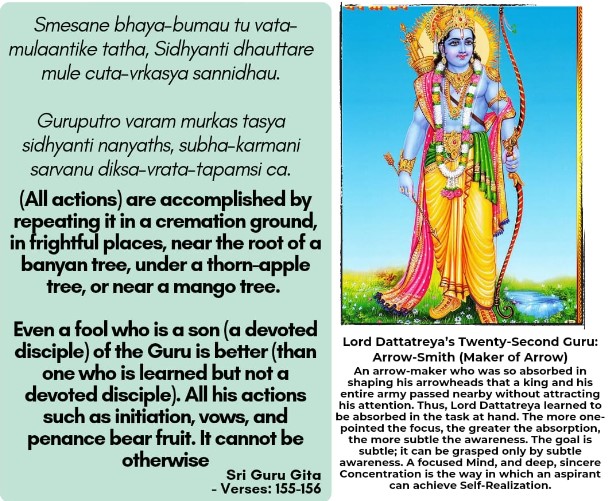
My twenty-second guru is the arrow-maker, who was so deeply focused on crafting arrowheads that he didn't notice when the king and his entire army passed by. From him, I learned the importance of being fully immersed in whatever task I undertake, no matter its size. The more I concentrate, the deeper my absorption becomes, and with deeper absorption comes a heightened, subtle awareness. The ultimate goal is subtle and can only be reached through this refined focus.
Lord Dattatreya’s Twenty-Third Guru, TheSpider (Makari)
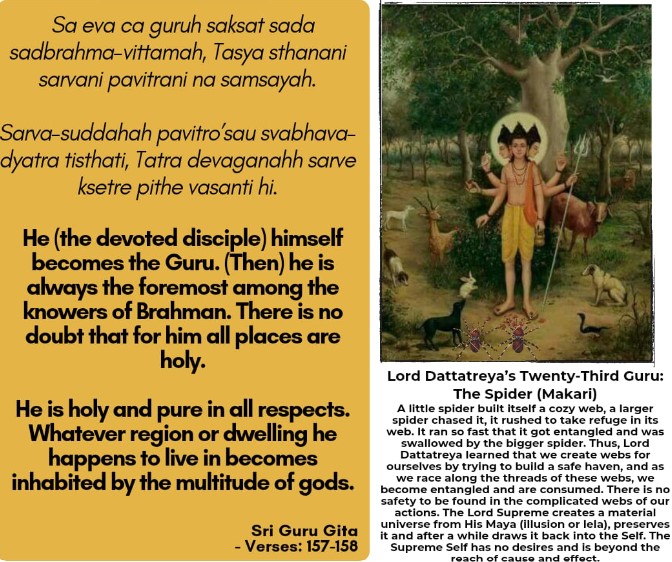
My twenty-third guru is the small spider that carefully spun a comfortable web. When threatened by a larger spider, it hurried back to its web for safety but became so entangled in its own creation that it was caught and devoured. From this, I learned that in our attempts to create secure havens, we often weave complex webs of our own making. As we navigate these webs, we risk becoming ensnared and ultimately consumed by them. True safety cannot be found in the intricate traps of our own actions.
Lord Dattatreya’s Twenty-Fourth Guru, The Caterpillar (Wasp, Bhringee)
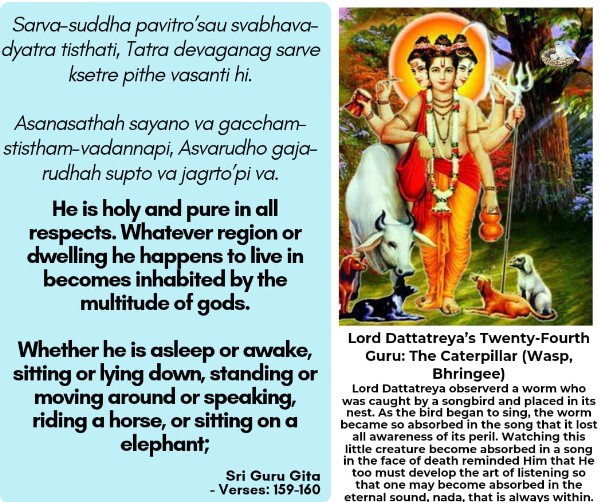
My twenty-fourth guru is the worm that was captured by a songbird and placed in its nest. As the bird sang, the worm became so captivated by the melody that it forgot its imminent danger. Observing how the worm became completely absorbed in the song, even in the face of death, taught me the importance of developing the art of deep listening. This reminded me that I must learn to focus on the eternal sound, nada, that resonates within me. Similarly, Lord Dattatreya realizes that whatever form a person continuously meditates on, they eventually become that form.